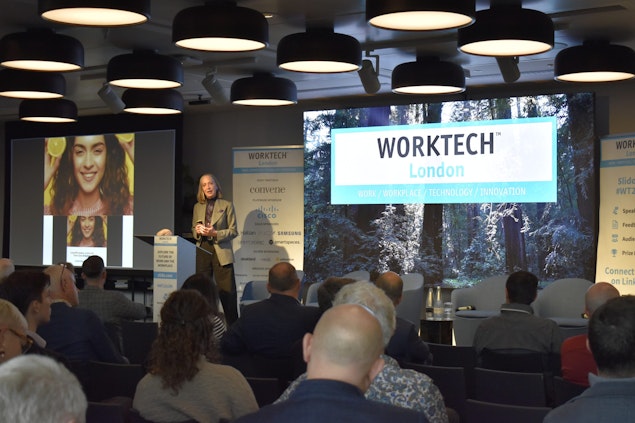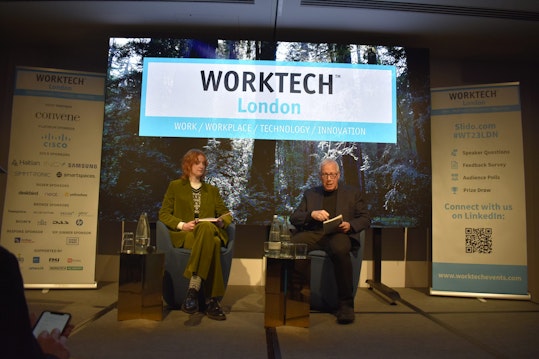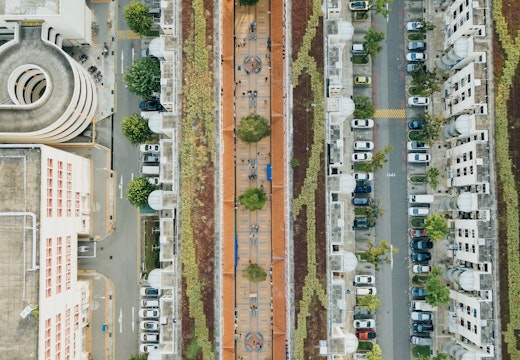London conference frames four standout themes for the future
This year’s flagship WORKTECH London event explored how cities can bounce back, where next for digital transformation, how we can reach net zero buildings and what works in workplace experience
Programmed around four topical themes – the future of cities, digital transformation, sustainability and workplace experience – WORKTECH’s flagship London conference this year set out to offer something for everyone in terms of where work and workplace go next.
Held at the impressive Convene meeting space in 22 Bishopsgate on 21-22 November 2023, the event featured 45 speakers over two days and provided plenty of new ideas, optimistic visions and reasons to believe that there’s light at the end of the tunnel for city planning, office real estate and workplace strategy. Here’s how the key themes panned out:
The future of cities
City centres have suffered as much as corporate workplaces in terms of a sluggish return to office, but keynote speakers Professor Ben Rogers of the Cities programme at the London School of Economics and Laura Citron of London’s business growth agency, London & Partners, both looked on the bright side.
The old industrial model of the city was unhelpful to current efforts at urban regeneration, explained Ben Rogers.
But having a 21st century knowledge-intensive city would create a creative economy scenario in which we’d all benefit from agglomeration in terms of innovation without the downsides of pollution and congestion. He used the analogy of bookshops, which suffered initially with online shopping, to explain how city-centres could recover and move up the value chain with a more specialist offer.
Laura Citron described London as evolving as a place, with investment holding up, the return to office middling in comparison with other global cities, and commuter travel reaching 70- 80 per cent of pre-pandemic levels. The big surge was in leisure travel into London on Friday nights and at weekends, suggesting that ‘connections and experiences’ would shape the city’s future. London needs to up its game, though, on providing wi-fi, public toilets and drinking water for visitors.
There should also be more attention to the finer details of the urban streetscape, according to Edwin Heathcote, architecture and design critic of the Financial Times, whose new book On The Street: In-Between Architecture explores a ‘lost realm’ of street furniture and red telephone kiosks. ‘We think of the city as being tough, but it is very fragile,’ said Heathcote, who observed that the key to better cities was planning. He criticised the current combative process in which planners simply try to lop a few floors off an office tower and claw back some green space from developers.
Digital transformation
There appeared to be two big tech narratives vying for attention at WORKTECH London. The first focused on system integration. Sam Wood of Cisco presented a unified technical strategy for hybrid work, Sam Tucker of Deskbird demonstrated how to use data to coordinate hybrid work and manage office space, and NHS programme director Rebecca Grindley took us inside a Milton Keynes hospital that is using location data to transform experience and operational efficiency.
How to integrate different data streams was a persistent theme, best summed up by Louise Morgan, digital development director at Laing O’Rourke, who argued there was currently ‘too much data and too little insight’.
The second theme pivoted digital transformation towards the enormous potential of AI. Dr Daniel Hulme, Chief AI Officer at marketing services giant WPP, usefully described six main application areas for AI: task automation, content generation, human representation, insight extraction, decision-making and human augmentation. All came with their own threats, said Hulme, conjuring up a world in which we no longer know what is true and bad actors weaponise AI for malign purposes. On the other hand, AI could also drive welcome advances in medical science enabling us to cheat death.
Sustainability
This theme examined a dichotomy between designers seeking to create novelty and desire around new office buildings while at the same time supporting a low carbon future. Architect Simon Alford of AHMM, past president of the Royal Institute of British Architects, took us on a tour of past design visions of the future before advancing a thesis around ‘forever buildings’ – long-life, loose fit structures that are less carbon-intensive and provide a frame for public space.
One way to reduce energy consumption in office buildings is to incentivise people to adopt more sustainable behaviours. Artists and researchers Ameera Kawash and Shira Waschmann of Orbital Bloom, a software start-up from the Royal College of Art, presented one of the standout innovations of the conference – a graphics platform with a gamification element that turns energy usage in a building into a high-resolution display of growing plants and flowers. The more energy you save, the more the garden blooms.
Workplace experience
Weaving throughout the London conference was the subject of experience. How people perceive their workplace has become as important as what they do in it. What will create a better environment? At the interior scale, better lighting is a good place to start, advised Dr Shelley James, the self-style ‘light lady’ who showed how light can improve sleep, resolve conflict, reduce back pain and support shift work. Creating a more homely, democratic and domestic-style workplace was also a productive approach, according to a case study on the workplace transformation at law firm Burges Salmon.
At the architectural scale, an in-depth look at Google projects at Mountain View and King’s Cross by Adrienne Lau of Heatherwick Studio emphasised human-scale neighbourhoods and interior urbanism with courtyards, town hall steps and nooks – a modular assembly of ‘soft architectures’. Generally, people needed places to nest and socialise, supported by HR policies that are open and flexible.
At the end of WORKTECH London, delegates voted in a series of polls on how they viewed the future. More than 60 per cent believed the city will thrive as a mixed-use cultural hub rather than primarily as a business destination. Adaptive reuse was voted as the best way to support a low-carbon office future. Views on the future of AI were divided with around a third saying it would lead to breakthroughs in medical science and the same number suggesting it would automate human labour. Providing a variety of settings as part of ‘interior urbanism’ was the top choice to improve workplace experience, with more than half of delegates choosing this option.
Register your interest in the WORKTECH24 London event here.

Image: a panel discussion at WORKTECH London featuring Ravi Lakhani, James Frankis, Pe-Ru Tsen, Louise Morgan and
Uli Blum

Image: Dr Shelley James presenting at WORKTECH London

Image: Professor Jeremy Myerson and Echo Callaghan in conversation at WORKTECH London








